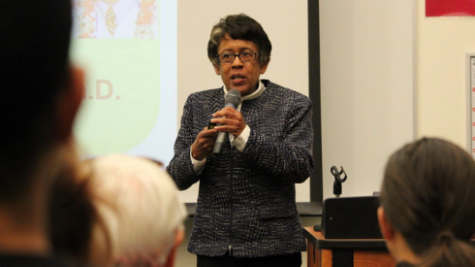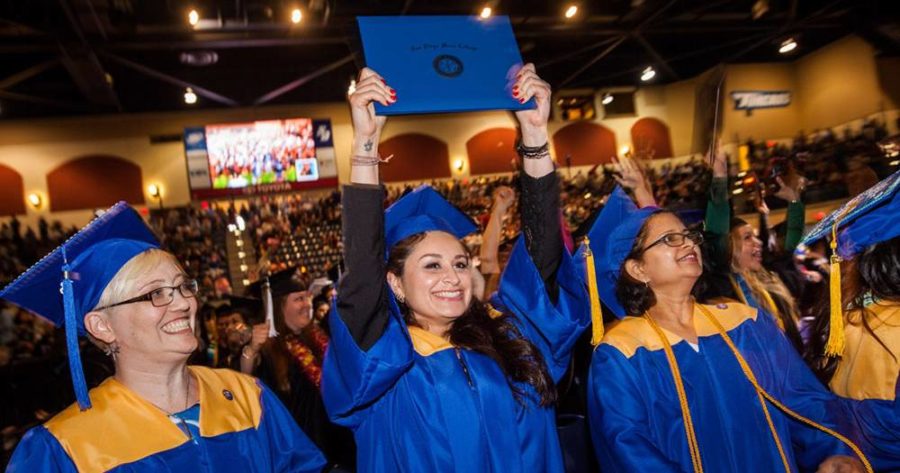Community college bachelor’s degrees now a reality
Governor Newsom signed new bill championed by former SDCCD chancellor
San Diego Mesa College Health Information Management graduates celebrate at their commencement ceremonies in 2018. The college’s students were among the first to earn a bachelor’s degree from a California community college, and bachelor’s programs are coming to San Diego City and Miramar colleges soon. SDCCD courtesy photo
October 7, 2021
California Governor Gavin Newsom signed Assembly Bill 927 into law on Oct. 6, which would open the door for more community colleges to offer bachelor’s degrees.
The bill, sponsored by State Senator and Chair of the Assembly Higher Education Committee Jose Medina (D-Riverside) expands the state pilot program that allowed community colleges to offer bachelor’s degrees in fields not offered by the University of California or California State University.
In a press release put out by Medina following the signing, the state senator lauded the bipartisan nature of the bill, saying it would increase student access to four-year degrees.
“AB 927 codifies the existing programs and enables other community colleges to offer baccalaureate programs that train students to pursue technical fields,” Medina said, “diversifying California’s economy and filling the skills gap.”

Constance Carroll, former Chancellor of the San Diego Community College District and founder of the California Community Colleges Baccalaureate Association — a nonprofit focused on expanding the ability of the state’s community colleges to offer four-year degrees — praised the legislation in a press release issued by the district on Wednesday, calling it a win-win for students.
“This is a historic decision that sets a bold direction for California’s 116 community colleges,” Carroll wrote, “enabling them to meet the workforce needs of local communities in an accessible, affordable, and high quality manner.”
The program was originally established in 2014, when then-Governor Jerry Brown signed Senate Bill 850, which allowed 15 colleges to offer bachelor’s degrees in certain workforce fields.
The pilot program was set to end in 2023, but further legislation extended that date to July 2026. AB 927 makes the program permanent.
In 2015, Mesa College was among the 15 community colleges selected to offer a bachelor’s degree as part of the 2014 pilot program.
The college was authorized to offer a four-year degree in Health Information Management, reflecting the increasing popularity of the region’s booming biotech industry.
Promoting the financial incentives of the HIM program in 2017, Director Connie Renda underlined that at $10,500, this bachelor of science degree costs less than equivalent programs at state schools.
The bill also requires community colleges to provide evidence addressing specific unmet workforce needs and stipulates that those bachelor’s degrees cannot exceed more than 25% of the total number of associate degrees offered by the college.
In a recent Forbes article addressing concerns of the potential impact of such legislation, President Emeritus of Missouri State University Michael Nietzel suggested the price of community colleges may increase due to the costs associated with creating bachelor’s programs, which may ultimately be inferior quality to those offered by four-year institutions.
According to a 2015 report by the Public Policy Institute of California, if current trends continue, the state will fall approximately 1.1 million college graduates short of the labor market demand by 2030.
Thirty-eight percent of all jobs in 2030, wrote the PPIC, are predicted to depend on workers with at least a bachelor’s degree, while only about 33 percent of workers will have one.
In a speech delivered at Cal State Northridge after signing the bill into law, Newsom said it would increase access to high-quality educational opportunities and bolster Califonia’s innovation economy.
“Everyone deserves a shot at the ‘California Dream,’” Newsom said. “We’re eliminating equity gaps and increasing opportunities at our universities to make those dreams a reality for more California students.”
With the ratification of this bill, California became the 25th state in the nation to allow community colleges to offer four-year degree programs in some capacity.
That list includes Oregon, West Virginia and most recently Arizona, whose Republican Governor Doug Ducey signed a similar bill into law in May, highlighting the bipartisan nature of such policies.
How did we get here?
AB 927 could potentially transform programming in community colleges throughout California, opening the California Master Plan for Higher Education adopted by the California legislature in 1960 to reinterpretation.
The CMPHE consisted of a series of reports commissioned by the state legislature meant to express the principles for higher education in the state, specifically designating the differences between the University of California system, California State University system and community college missions.
The main stipulation was to designate what kind of programming each of the systems could offer.
As the state’s primary research institution, the UC system was given jurisdiction over Doctoral programs, with the exception of the Doctor of Education degree and inter-institutional doctorates that CSUs could award jointly with a UC or private institution.
The CSU system, in turn, could offer a master’s degree with the exceptions listed above.
According to the website of the UC office of the President, community colleges,on the other hand, “have as their primary mission providing academic and vocational instruction for older and younger students through the first two years of undergraduate education (lower division).
“In addition to this primary mission, the Community Colleges are authorized to provide remedial instruction, English as a Second Language courses, adult non-credit instruction, community service courses, and workforce training services.”
The introduction of AB 927 represents a fundamental change to the higher education master plan, changing the scope of the community college mission.
Potentially expanding community college offerings to include four-year degrees highlights questions regarding the affordability of public education.
The current tuition price for a bachelor’s degree in the San Diego area for in-state students ranges from $60,184 at UCSD, $22,968 at SDSU, and an estimated $211,456 at the University of San Diego, a local private institution also offering a bachelor’s program.
The question remains how the incorporation of four-year degrees into the community college system will affect costs for students pursuing other forms of public education.













Hiiiiiii • Oct 7, 2021 at 5:34 pm
Wow! Finally the dream becomes a reality.